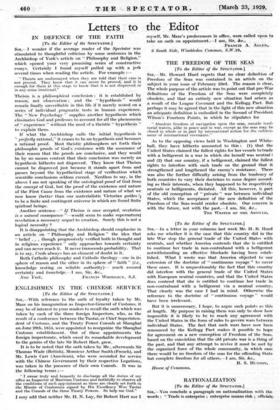SIR,—In a letter in your columns last week' Mr. H.
B. Hurd asks me whether it is the case that this' -country did in 'the
late War stop the general of the United States with neutrals, and whether America contends that she is entitled to continue her trade in non-contraband -with a belligerent notwithstanding an effective blockade- having been estab- lished. What I wrote was that America objected to our extension of the doctrine of " continuous voyage " to- cover these cases. It is unquestionably the fact that this country did interfere with the general trade of the United States with European neutral countries, and that the United States does contend that she is entitled to continue her trade in non-contraband with a belligerent via a neutral country. That clearly was the ease I had in mind. Otherwise the reference to the doctrine of " continuous voyage " would have been irrelevant.
But it is unnecessary, I hope, to argue such points as this at length. My purpose in raising them was Only to show how impossible it is likely to be to reach any _agreement with the United States in the form of rules to govern wars between individual States. The fact that such wars have now been renounced by the Kellogg Pact makes it possible to hope for agreement on a new conception of Freedom of the Seas, based on the conviction that the old private war is a thing of the past, and that any attempt to revive it must be met by the organized force of the whole community, in which ease there would be no freedom of the seas for the offending State but complete freedom for all others.—I am, Sir, &c,
House of Commons.
R. S. HUDSON. .
















































 Previous page
Previous page